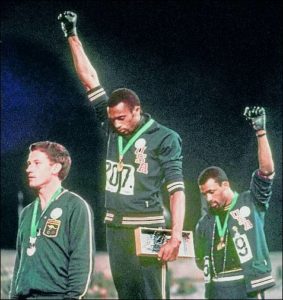If you don’t know, I’m white. I’m 100% Scotland/Ireland/France white. Pug nose, un-tannable fishbelly white. My hair has been turning white since I was 19. I slather on the moisturizer, but I have had wrinkles since middle school.
But. I live in the south. I have lived in the south my whole life. The most north I’ve ever lived is D.C., and that’s still the south (technically). I am familiar with race relations. It’s not like I spent my life in Omaha or anything where I don’t even know if they have “persons of color.”
A lot of people want to be an “ally.” Whites want to be allies for blacks. Straights want to be allies for gays. Men want to be allies to women. And on and on. But a lot of these people don’t understand that to be an ally, you have to be willing to pay for it. You have to be risking something.
When I think about allies, and what it really means to be an ally, I think of a white Australian guy named Peter Norman. Peter Norman won the silver medal in the 200-meters at the 1968 Summer Olympics. His time, 20.06 seconds, still stands as the record time for an Australian running 200 meters. Two African-American athletes, Tommie Smith and John Carlos, won first and third place.
You’ve seen this photograph. Two black athletes on an Olympic podium, raising their fists in the Black Power salute with their heads bowed. They’re wearing black gloves—Smith on his right hand, Carlos on his left. It’s a powerful image of hope and reverence and defiance. And next to them, sometimes cut out of the frame, is Peter Norman.

After the race, Smith and Carlos told Norman what they planned to do on the podium. They asked if he believed in human rights, and God, and Norman said yes. He said, “I’ll stand with you.” And when Carlos left his gloves in his room, Norman suggested they share the pair they had with them. Carlos said he expected Norman to look afraid when they got up on the podium, to see fear in his eyes, and he didn’t. Carlos said, later, “I saw love. Peter never flinched.”
When Norman went back to Australia, he wasn’t well received. Australia refused to send him to the 1972 Olympics, even though he qualified repeatedly. In fact, Australia didn’t send a men’s track team at all. In the 80s, Norman tore his Achilles tendon, then later suffered from alcoholism, a painkiller addiction and severe depression.
Norman died in 2006.
Smith and Carlos were pallbearers. They stood side by side, at the front of Norman’s funeral procession, his coffin on their shoulders. “Go and tell your kids the story of Peter Norman,” Carlos said.
This is what I mean when I say that if you’re going to call yourself an ally, you have to be willing to risk what you have. And you have to take that risk unflinchingly, and with love.
